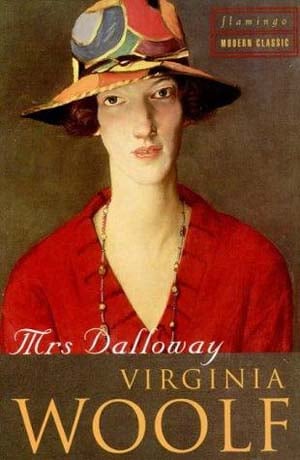The Voyage Out by Virginia Woolf (1920)
By Nava Atlas | On January 27, 2015 | Updated September 20, 2022 | Comments (0)

The Voyage Out by Virginia Woolf was the first novel by this iconic English author, published in Britain in 1915 and in the U.S. in 1920. Written at a point when Woolf was suffering from an acute period of mental illness during which there was a suicide attempt, the novel proceeded painfully slowly.
Nevertheless, it showed all the promise of her later work that would include stream of consciousness writing and themes of sexuality and death.
The final work was over-edited; her publisher felt that her commentary on British politics was too pointed and that it could nip her career in the bud.
Later, Louise de Salvo, a Woolf scholar reconstructed the novel from earlier drafts and released it as Melymbrosia (Woolf’s original title) in 1981.
The plot, such as it is, centers on Rachel Vinrace, who voyages to South America on her father’s ship in a quest for self-discovery. Rachel’s shipmates allow Woolf an opportunity to satirize British society in the Edwardian era. We first meet Clarissa Dalloway, who readers will encounter later in Mrs. Dalloway, one of Woolf’s most popular and accessible novels.
The Voyage Out was unlike anything else that had been published, and so critical reception was mixed. In E.M. Forester‘s review, he wrote:
“It is absolutely unafraid… Here at last is a book which attains unity as surely as Wuthering Heights, though by a different path.” Other reviewers were not so kind; the 1920 review in the New York Times, following, was largely negative, using the words “futile,” “tedious,” and “confusing” to describe the book.
While it’s not considered Virginia Woolf’s greatest effort, literary history has nonetheless proven this reviewer wrong.
. . . . . . . . . . .
See also: A review of Mrs. Dalloway
. . . . . . . . . . .
Review of The Voyage Out in the New York Times (1920)
A review of The Voyage Out by Virginia Woolf, originally published in the New York Times, June 1920: This English novel, by an English writer, gives promise in its opening chapters of much entertainment. Later, the reader is disappointed.
That the author knows her London in its most interesting aspects–those in which members of Parliament and their coterie of relatives and friends are the active figures–there can be no doubt.
But aside from a certain cleverness–which, being all in one key, palls on one after going through a hundred pages of it–there is little in this offering to make it stand out from the ruck of mediocre novels which make far less literary pretension.
. . . . . . . . . . .
. . . . . . . . . . .
As for the story itself, it is painfully lacking, both in coherency and narrative interest, Ridley Ambrose, a professor, and his wife, Helen, a woman of the smart London world, are going to the antipodes on a vessel owned by Helen’s brother-in-law, Willoughby’s daughter, 24 years old, Rachel, a Mr. Pepper, a wealthy and eccentric, with a leaning to abstruse learning, and a middle-aged, philandering member of Parliament and his wife, Clarissa, whom they pick up at Lisbon.
These people all talk smartly, and one rather wonders what it is all about, for it does not seem to get anywhere in particular. Rachel has been kept by her father in ignorance of everything which might be presumed to injure the mind of a “young person.”
So it is not strange that one night she permits Mr. Dalloway to kiss her and confesses that she rather likes the sensation. Later, Rachel is turned over to Helen to be brought up as her father would wish–that is, a proper kind of English young lady.
So the story maunders on, and the fact that it is crowded with incident, most of it futile, and that the clever talk by everyone continues in a confusing cataract in every chapter, does not save it from becoming extremely tedious.
The Voyage Out is announced as the author’s first novel. That fact is the most hopeful thing about it. With the cleverness shown here, crude as most of it is, there should be a possibility of something worth while from the same pen in the future.
. . . . . . . . . . .
Melymbrosia, a modern revision of The Voyage Out
. . . . . . . . . . .
More about The Voyage Out
- Wikipedia
- Review on Yale’s Modernism Lab
- Reader discussion on Goodreads
- Listen to The Voyage Out on LibriVox
- Full text on Project Gutenberg



Leave a Reply